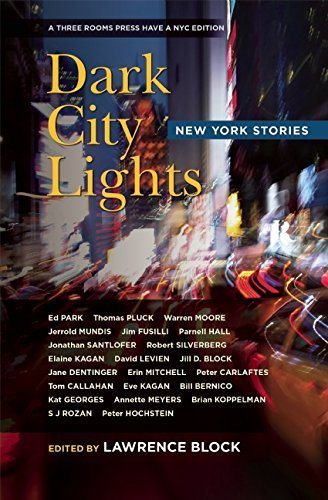Thomas Pluck's Blog, page 24
March 16, 2015
Richard Price interviewed by David Simon about The Wire, The Whites, and more
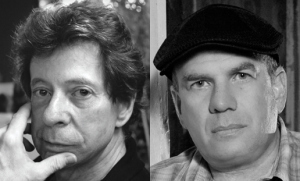 I had the pleasure of being in the audience when author Richard Price was interviewed onstage by journalist and TV producer David Simon at New York’s 92nd Street Y. The creator of THE WIRE interviewing the author of CLOCKERS, FREEDOMLAND, LUSH LIFE, THE WANDERERS, episodes of THE WIRE from Season Three on, and most recently, using the pen name Harry Brandt, author of the crime novel THE WHITES? It took me three hours of trains back and forth to see them talk for 90 minutes, and it was worth the time. They will be reading again in Philadelphia, introduced by author Dennis Tafoya, so you’ll have another chance. (Check out Price’s page for appearances for more details).
I had the pleasure of being in the audience when author Richard Price was interviewed onstage by journalist and TV producer David Simon at New York’s 92nd Street Y. The creator of THE WIRE interviewing the author of CLOCKERS, FREEDOMLAND, LUSH LIFE, THE WANDERERS, episodes of THE WIRE from Season Three on, and most recently, using the pen name Harry Brandt, author of the crime novel THE WHITES? It took me three hours of trains back and forth to see them talk for 90 minutes, and it was worth the time. They will be reading again in Philadelphia, introduced by author Dennis Tafoya, so you’ll have another chance. (Check out Price’s page for appearances for more details).
Price caused a bit of a kerfuffle among the online crime fiction kaffee klatch this month in his interview with the New Yorker, about why he used a pen name for his latest novel. And that’s the question that David Simon—who also happens to be married to bestselling mystery author Laura Lippmann—decided to open with. “Is genre so bad that you had to change your name?”
I ’ll be paraphrasing throughout; recording was verboten, and my pen only goes so fast. Any lack of clarity here is purely mine.-TP
The pen name is a homage to Price’s first agent, Carl Brandt. THE WHITES was envisioned as purely a genre book, an “urban thriller,” and thrillers “rarely thrill,” just like horror stories are “rarely horrifying.” The idea came quick, and he expected to write it fast, but it ended up taking four years. “I know how to dress down, but not how to write down.” He later clarified this to mean “stripping down,” not that he was stooping to write genre.
That was good enough for me. I side with Jay Stringer, who finds that those of us who both write and read crime fiction tend to have thin skins, and we should dislodge the chip on our shoulder, because all it does is give credence to the concept that these books are “guilty pleasures,” whether they be puzzling mysteries, page-turning thrillers, or dark walks down alleys we’d never dare tread in reality. The ghetto here is mental, and while there are plenty of literary snobs out there, the term “literary” is a category, not a mark of quality. There are great, good, middling, and formulaic stories of all kinds. THE WHITES is both a very good crime novel and a very good novel, and it’s pulpy nod to genre is its high concept—someone is killing the “white whales” who got away from a group of hard-nosed, mostly retired police.
(In my “Fresh Meat” article I went into more depth of what Price does with the premise, and you can read me review of THE WHITES here.)
Now that we’re past that, here’s what they talked about.
David Simon was amazed by CLOCKERS, where Price “got to it [the story of street corner drug dealing kids] before the journalists did. How did he do it?
Price responded that his first four novels were more personal, and unlike his current work. The fourth book was tough and unsatisfying, and he quit writing novels for eight years to write screenplays instead. He got the job writing THE COLOR OF MONEY, and Martin Scorsese told him he had immerse himself in pool hall culture to get it right. He headed South to learn. He’d never researched a novel before, he “wrote what he knew,” and once he found that research could be turned into art, he was hooked on writing again.
For SEA OF LOVE he did ride-alongs with Jersey City police, which eventually would lead to CLOCKERS. In the early ‘80s he had a cocaine addiction, and he grew up in the Bronx projects (which he called “tiger cages,” after the torture chambers from the VietNam War) and he did some work in a rehab center with young addicts. “There is no ‘I’ in novel,” he joked. “I learned how to report a book.”
THE WHITES came about from a “backlog of memory,” which he thought would “let him write fast.” But “what caught me by surprise was the family dynamic,” which he’d tried to capture before, but found elusive. The family story in THE WHITES is quite compelling, but the women suffer; Yasmeen the ex-cop feels just like his woman cop from LUSH LIFE and seems plucked from Sonja Sohn’s performance as Kima Greggs in THE WIRE. Carmen, the wife of Harry Graves, is a mystery to us; part of this is required for the mystery of the story to play out, but she feels too much like the inscrutable, emotional woman that men blame their own lack of cognizance upon. Harry is a masterful observer and investigator, and the excuse that “the cobbler’s children have no shoes” and he can’t turn this eye on those close to him, feels cliché.
From here they segued into how much is taken from reality and how much is invented, when Price researches his books so thoroughly. Simon recounted his favorite scene from CLOCKERS, where the junkies are scrapping salvage from the enormous dome of the Margaret Hague Maternity Hospital, a ziggurat-like edifice built during the New Deal as a thank you to Frank Hague for delivering (or not ransoming) FDR the Democratic vote. Thousands of Jersey City citizens were born there, it was a monument to Hague’s mother, and also his power; the citizenry owed their very births Big Frank Hague and his utterly corrupt system of patronage, and it was symbolic in the allowing greed and power to grind what should be a beautiful riverside city into an ugly pit of crime and graft that is still clawing its way out.
For more on Frank Hague, read American Dictators: Frank Hague, Nucky Johnson, and the Perfection of the American Political Machine by the late Steven Hart.
This arresting image stuck with Simon, and Price went into detail. During his Jersey City ride-alongs, he learned the story of junkies scrapping metal from the enormous medical center that was half-abandoned, with only the ER operational, and throwing radiators and pipe out the windows to pick up later. The police were onto them, and because an ex-cop ran a scrapyard, most of them would let the street people do the work and steal the scrap to salvage themselves. “There was one story I heard of two cops watching the same piece of expensive copper pipe falling, racing to steal it in their cruisers, and crashing and giving themselves both a concussion.”
“What about the Great Dome?” Simon asked.
“I made it up!” Price laughed. “When you do it, you get fired! I get paid!”
Simon laughed, and went on to say that he felt Price’s humor often went unappreciated, on screen and in print.
“Humor, to me, is different than comedy. It’s about evoking recognition in the reader.”
And much of his fiction relies on that well-researched confidence of verisimilitude, that it may have never happened, but it could, and the readers know it.
When asked why police keep giving him access, Price said that he does his best to “Write faithfully. Let them dig their own graves, and build their own monuments. If I have to tell you someone is bad, that’s boring.” He said it was imperative to have the same empathy for the police and the street people, otherwise fiction devolves into caricature—the gritty cop who does evil because that’s the only way to “save us,” and depictions of inner-city people that is no better than “minstrelsy.”
Though apparently his cop friends avoided him after CLOCKERS—he was terrified that they were infuriated, or hated the book—but the truth was, they hadn’t read it! (Fellow writers take note). He also sent a copy to Toni Morrison, who he’d become friends with, and was concerned she would bust him as a “white supremacist,” but she also didn’t read it. “Like Toni Morrison doesn’t have enough shit on her end table already!” His father was a cabbie, a grocer, and a window-dresser for Modell’s Sporting Goods. And he didn’t like THE WANDERERS. Price’s response, which I commend, was “Oh yeah? YOU write a book!”
When George Pelecanos and David Simon approached him to write for THE WIRE, he had to research again. He’d put everything into CLOCKERS. “I hate writing. It’s worse than jogging,” Price said. He compared his procrastination to how a jogger wastes time buying the best shoes, talking techniques and trails with other joggers for hours, before settling down to do thirty minutes of actual exercise. Price wastes time online, including managing his own Facebook page, and researches intensely. He gave a nod to Nicholas Pileggi, who said he knew he was done researching CASINO when he would ask a mobster or a croupier a question, and found himself mouthing the answers.
Simon got things back on track by saying that crime stories, specifically those involving police and the underclass, were so compelling because they fight on the “fault lines of society,” and “where cop and street meet, a city is revealed.”
Price was more interested in talking about the commonalities between police officer patter and hip hop, how they use a life of memories to go off on unexpected tangents, and found it difficult to ask them any philosophical questions. For example, asking “You carry death on your hip! How does that feel?” and getting back, after a long silence, “When you worked with him on NIGHT AND THE CITY, did you call him Bobby, or Mister DeNiro?”
These snippets of realism are often fought over. When researching FREEDOMLAND, David Simon took Price to see some people he knew from his crime beat, including Fat Curt, a heroin addict in rehab, whose hands had “swollen up like catcher’s mitts.” Curt was unimpressed with Price’s credentials, and said “you is some kind of apple scrapple.” Simon cursed himself, because he knew Price would be able to use that in a book before he could use it in the show.
Their final WIRE anecdote involved the joke between the police, as they drank in the bar after shift. A question, or dare of sorts, where Carver asks Herc, “If you could sleep with any three women, of all time, if you slept with ONE guy… who would it be?” (You might as well watch the whole scene).
And Richard Price came up with Gus Triandos, a big hulking catcher, “with legs like a Stegosaur,” who had a tough season of catching Wilhelm’s knuckleballs, and “he’s do it out of compassion.” The thing was, Gus Triandos was still alive, and Simon had to call him, a nearly 80 year old man, for permission to use his name.
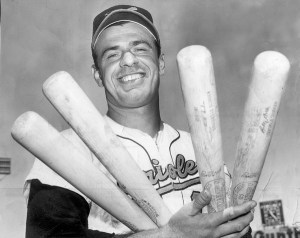
Gus Triandos
He couldn’t explain it over the phone, so he sent the pages, and got called back, expecting a tirade, but Triandos thought it was really funny.
But just in case, Price had to write an alternate scene, with someone they wouldn’t need permission for. So he reached into his past, and found a ‘50s wrestler with acromegaly, a heel named The French Angel. Price said the Angel was his grandmother’s favorite, and using her voice, he explained, “he is so ugly, but I could look into his eyes, and see he was a good man! He goes to leper colonies, to wrestle for them! And the lepers were so thankful, but they couldn’t touch him… so they kissed his shadow!”
And they ended that great story by asking… “If they all had leprosy… who was he wrestling?”
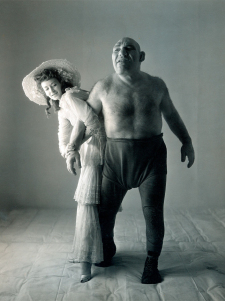
The French Angel
It was an entertaining evening. Richard Price writes some of the best crime fiction out there. He may not embrace the genre, but his novels walk the same territory as Dennis Lehane, Laura Lippmann, Lawrence Block, Dashiell Hammett, and Mo Hayder: using our criminal acts against ourselves to reveal something of our deepest nature.
Tagged: David Simon, Richard Price, The Wire

March 14, 2015
The Weiner!
Because Sheldon missed my reply to his comment- I’m making a post.
Sheldon, you won the copy of Clock Without Hands. Use the Contact Form at the upper right to send me a mailing address, so I can get your book in the mail.
Thanks all for playing…

March 3, 2015
Trigger Warnings and Not Getting It
Thanks to that college professor who didn’t want to warn students- one of whom was a victim of rape- about a graphic rape scene in a movie he was showing his class, some have taken “Trigger Warnings” to be a sign of “political correctness,” when they exist as a courtesy to those among us who experience PTSD as a result of physical or emotional traumas, whether they experienced it on the battlefield, or through physical or emotional abuse. May you never feel the need to be warned. But don’t mock those who do.
Gaiman absolutely does not get it, by appropriating this term to say “well, life is dangerous” to sell his collection of horror stories. I like his work and he seemed nice enough when I saw him read at FDU last year, but this was a bad choice, and his explanation is incredibly narcissistic, and comparing a Trigger Warning to an R-rating on a movie or a “For Mature Audience” label is beyond condescending. This isn’t a matter of squeamishness or immaturity. When 25% of women will be sexually assaulted, and 10% of men, when we have sent thousands to battlefields, it simple courtesy that acknowledges these people as existing; it is not marking violence as an incorrect thought, or horrifying fiction as somehow suspect and unseemly, on the first step toward censorship.
If you choose to write about violence, especially sexual violence, hopefully you’ve researched it beyond watching your share of movies. If you’ve experienced it, as victim or witness, or even the perpetrator, you’ll know it stays with you. Trauma leaves impressions on the brain. When writing about it, what responsibilities do we have? Some will say none, that freedom comes with zero responsibilities—and certainly, a law enforcing those responsibilities would have a chilling effect, so let’s make sure we never pass one—but I find that courtesy is free and the only thing irking me about putting a “trigger warning” before sharing a particular graphic news story or publishing a piece of fiction that draws from the pit of darkness left by trauma, is the immature response against being “told” what to do.
But we’re not telling anyone what to do. We’re asking politely, Mr. Gaiman. And naming a book this way comes off as mockery. I hope it gets you all the sales you hoped for.
For my friend Elizabeth’s take on it—the post that inspired me to dust off this one, which I had decided not to publish a month ago—check out her website, Amber Unmasked.
Tagged: Neil Gaiman, PTSD

February 24, 2015
Your favorite lesser known author? Win a copy of Clock Without Hands
Who’s your favorite underappreciated, nearly forgotten author?
Mine is Gerald Kersh. Probably best known for writing NIGHT AND THE CITY, upon which the famous film noir was based (and the Robert DeNiro film, screenplay written by Richard Price), Kersh was a unique larger than life character, a big hulking “villanous-looking” man with a great beard and booming voice, who wrote drama, humor, mystery, science fiction, and pretty much whatever he wanted, with a fantastic talent for capturing human frailty in few words, and telling tales no one else could tell.
Harlan Ellison was a champion of his work and that’s how I discovered him, and that’s why I wrote Harlan way back when, in a letter that’s had a life of its own. And our correspondence continues–I recently mailed Harlan a copy of the book, inscribed of course. (When I met him in high school at a science fiction convention, he signed a stack of my books, so one good turn deserves another.)
Clock Without Hands includes my introduction, and three powerful novellas by Gerald Kersh. The titular tale concerns a bloody murder, a cold journalist, and an invisible witness tortured by sudden fame; the second is The Flight to World’s End, about a young orphan escaping the brutality of a reform home; and the final one is Fairy Gold, about a practical joke that goes horribly wrong.
For a chance at winning a copy, please leave your favorite lesser-known author in the comments, with a story or book of theirs we should hunt down. I’ll pick a random comment next week and share the winner in a new post.
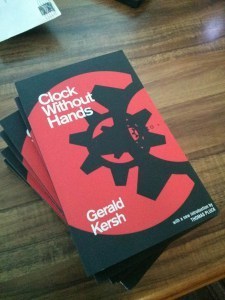 And if you don’t win, you can buy the paperback or ebook here at Valancourt Books.
And if you don’t win, you can buy the paperback or ebook here at Valancourt Books.
Tagged: contests, Gerald Kersh

February 21, 2015
Noir at the Bar Manhattan 3/8
 FEATURING: Hilary Davidson, Angel Colón, Dave White, Thomas Pluck, Todd Robinson, Matthew Lee Goldberg, Nick Kolakowski, Tracey Landau, Vincent Zandiri, Teel James Glenn, and… Anthony Schiavino!
FEATURING: Hilary Davidson, Angel Colón, Dave White, Thomas Pluck, Todd Robinson, Matthew Lee Goldberg, Nick Kolakowski, Tracey Landau, Vincent Zandiri, Teel James Glenn, and… Anthony Schiavino!
We have a mailing list for Noir at the Bar Manhattan, never spam (not even pork roll!) Sign up here to never miss an event.
Shade is at 241 Sullivan Street in Manhattan, corner of West 3rd, a ten minute walk from the 9th Street PATH station. (That’s how I get there…) for NJ folks.
Join us. It’s always a good time, Shade is a great neighborhood bar with fine beer, whiskey, and crepes! (Noir crepes. They’re full of brie and human failure. They also serve panini of existential pain).
Tagged: Noir at the Bar

February 20, 2015
The Oscars 2015
 I watch The Oscars because Firecracker does. I don’t think they choose the best movies made in a certain year, but they choose some of them. But we always try to watch all the best picture and actor/actress contenders. Here are my thoughts on the bunch, in no particular order:
I watch The Oscars because Firecracker does. I don’t think they choose the best movies made in a certain year, but they choose some of them. But we always try to watch all the best picture and actor/actress contenders. Here are my thoughts on the bunch, in no particular order:
American Sniper
Having read Kyle’s biography, I found the movie fabricated and simplistic, though Bradley Cooper’s performance was excellent. If Selma gets slammed for poetic license, this one ought to as well. It’s a glowing portrait of an elite soldier, cut down while he was trying to help other veterans wounded inside and out, but much is fabricated. The story Kyle told in his bio did not need embellishment with sniper duels and hunting pychos who drill holes in children’s heads to make it compelling.
Whiplash
This movie surprised me the most. JK Simmons as a brutal conductor and music instructor who takes a talented jazz drummer into his conservatory band was more gripping and fascinating than any of the other movies this year, including the war movie. That says a lot. Simmons was amazing, but good luck defeating Cooper and Cumberbatch with their promo campaigns and fan base.
Selma
I was very surprised that direct Ava DuVernay and David Oyelowo, who played Martin Luther King, did not get nominated. They turned history into a compelling and prescient story, and they couldn’t use any of MLK’s real speeches because they are owned by a media conglomerate. You don’t notice. Writer Paul Webb’s script and Oyelowo’s stunning performance distract from that. The LBJ story felt like unnecessary tension; I like Tom Wilkinson a lot, but his New England accent kept breaking through and I couldn’t see him as Texan at all. It was quite glaring.
The imitation Game
This is a badly written Oscar-bait movie built around Benedict Cumberbatch’s excellent portrayal of Alan Turing, the genius who cracked the Enigma code, built some of the earliest computers, and was tormented to suicide by the British government for being homosexual. It’s a story that needed to be told, but the World War II story of cipher cracking and espionage was condescendingly spoonfed to the audience. They made it seem like Turing came up with the idea to not let the enemy know when you crack their ciphers! This is only a Picture nominee because they need 10 of them.
Birdman
This was a refreshing change of pace, but it’s still a Hollywood story about Hollywood, however quirky it may be. Michael Keaton gets a role he can chew on, and does a great job. It’s a hilarious, painful, and touching story well told, and Emma Stone shows great talent in her supporting role as his daughter. The unbroken shot feels like showing off, but this is great storytelling and a story that is easy to like. It lacks the substance of the other nominees like Selma, Sniper, and IG, but it’s unforgettable and full of great performances.
Boyhood
The 12 year experiment of filming a young actor from age 6 to 18 makes a great story out of everyday life, and its naturalism lays the artifice of Hollywood bare. Patricia Arquette is excellent, and deserving of her nomination. The story is unexpected and emotional without falling into cliche, though I found one section pandered politically to the left as much as Eastwood’s loving paean to the Iraq invasion pandered to the right.
The Grand Budapest Hotel
My favorite of the bunch. It’s been on cable and I’ve had the pleasure of watching it again and again, but it came out so long ago that its chances are probably hurt. Wes Anderson’s best movie yet, he sets his story in the everyday life of a fanciful hotel on the brink of the fascist slaughters that led to World War 2. Some criticized setting a comedy during the time, but he doesn’t shy from brutality, and tells a hilarious, heartfelt, sentimental story of the civilization destroyed by hatred, with unforgettable characters (Willem Dafoe’s brutal henchman being my favorite). Even if you don’t like Wes Anderson’s other films, this one is never boring or overly twee.
The Theory of Everything
Eddie Redmayne’s performance is uncanny, and the story of the famous astrophysicist and his family as he deteriorates with motor-neuron disease is made incredibly compelling. This is how you make a biopic. It is direct, it does not inject storylines, though it does simplify his life. My bet for the best actor win, though JK Simmons was incredible as well.
Wild
I thought this was a better story and film than some of the BP nominees. Reese Witherspoon disappears into her character, a woman devastated by loss who goes on a grueling trek to purify herself of self-destructive tendencies. She is not an easy character to like, which made me like the movie more. Laura Dern is great as her mother, but I’ve seen her do more, and think this is one of those “she deserves one” noms. Which brings me to:
Into the Woods
This was boring and horrible, and Meryl Streep gets a nom for this? Just make a Being Meryl Streep Oscar already. She’s great, yeah. But this musical felt like a Disney TV movie that dragged on and on.
Gone Girl
A good adaptation, and Rosamund Pike was great as Amazing Amy. I’d give Witherspoon the nod over her role in this one. Fincher made a by-the-numbers adaptation with a few inspired bits of casting, and made the third act reveal a Marilyn Manson video that just felt ridiculous.
Ida
This is the Polish entry for best foreign film, a contemplative, character-driven story about an orphan who becomes a nun, then learns she has an aunt: a morose, drunken ex-judge who sent people to prison camps for defying the new socialist government. Set in the ’60s, the horrors of World War II are not long past, and as they seek the graves of Ida’s parents, we spend time with two enthralling characters as we revisit the ugly history of the last century.
Still need to see Foxcatcher, Still Alice, and The Judge. The weekend will be a busy one… but right now, my choices and bets are as follows. (Choice is who I’d vote for, bet is who I think the academy will pick).
Best Picture: I choose The Grand Budapest Hotel, the Academy picks American Sniper
Best Actor: I choose Eddie Redmayne, the Academy picks Michael Keaton
Best Actress: I choose Julianne Moore, Academy picks Julianne Moore (I have not seen Still Alice; I love Julianne Moore)
Best Supporting Actor: I choose JK Simmons, Academy picks Robert Duvall (I have not seen Foxcatcher or The Judge)
Best Supporting Actress: I choose Patricia Arquette, Academy picks Meryl Streep (because she needs her Oscar for singing this time)
Best Animated Feature: I wish The Lego Movie had been nominated, it was so much better than it had any right to be. The Academy picks How to Drain Your Dragon 2 (tee hee). Like with the snub of Fantastic Mr Fox, the Disney/Dreamworks machine gets wins for predictable remakes of the same old story over and over. (I loved UP until the ending, which was just awful writing. Remember kids, we can only solve problems by killing people, even in a whimsical film about a flying balloon house…)
Tagged: Oscars

February 12, 2015
Fresh Meat: The Whites, by Richard Price (as Harry Brandt)
Over at Criminal Element I give a review and a sneak peek at THE WHITES, the latest from Richard Price. I’m a big fan of his work on The Wire, and his novels Clockers, Lush Life, and The Wanderers.
Tagged: Criminal Element, Reviews, Richard Price

February 11, 2015
Win a Copy of Dark City Lights
If you’re on Goodreads, you can enter for a chance to win a copy of Dark City Lights: New York Stories, edited by Lawrence Block, which includes my story “The Big Snip.” Also stories by some folks named SJ Rozan, LB himself, Jonathan Santlofer, Ed Park, and many more.
Tagged: contests

February 4, 2015
Hot Rod Heart: A Noir Novelette
My noir novelette HOT ROD HEART is now available:
Bobby and Karen fit together like two sharp-toothed gears, suping up cars, racing them for pinks, and selling their rods to scrape a living. Then an old friend comes calling, and the jealous, brutal world conspires to tear them apart.
A fierce and fiery chopped & channeled noir tale from the author of the explosive action thriller Blade of Dishonor, and Steel Heart: 10 Tales of Crime & Suspense. (This appeared in slightly different form in Hoods, Hot-Rods, and Hellcats as “Red Hot.”)
Tolino (aspet, paisan!)
Tagged: 50s, Hot Rod Heart, Noir

January 31, 2015
Visiting Alcatraz: So Close to Freedom
I wrote n article for Criminal Element on Alcatraz past and present, Ai Weiwei’s art exhibits and meeting a former inmate when I visited the island last year.
Read it here:
Visiting Alcatraz: So Close to Freedom
Tagged: Alcatraz, Criminal Element, Prison

Thomas Pluck's Blog
- Thomas Pluck's profile
- 122 followers


